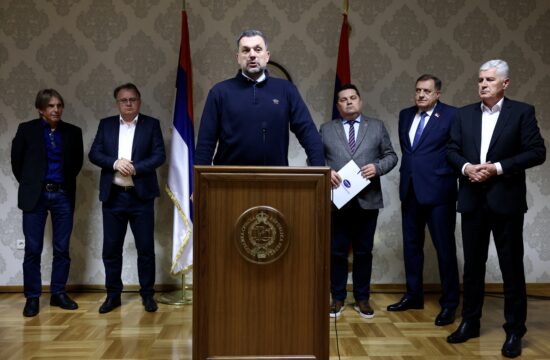Officials of Karlovac County and the municipality of Velika Kladusa, Bosnia and Herzegovina, negotiated on Tuesday in Duga Resa cooperation in a project of long-term development of agricultural production in Bosnia and Herzegovina, Montenegro and Croatia, which will be co-financed through the EU's INTERREG programme.
It is a project of cross-border cooperation between Bosnia and Herzegovina, Croatia and Montenegro, coordinated by the northwestern Bosnian town of Velika Kladusa, so the talks with representatives of the City of Duga Resa and other local units of the Karlovac County were attended by the Velika Kladusa mayor, Fikret Abdic.
The municipalities in Karlovac County, that have shown interest in the project, are part of a total of about 40 municipalities of the three countries, which were visited by the representatives of the municipality of Velika Kladusa and then offered to be their partners in the project, with the aim of cultivating uncultivated land for the benefit of local communities.
The adviser to the Velika Kladusa mayor, Ervin Abdic, told reporters after the meeting that the project was definitely underway, and that they only had to determine who would participate in it. He said that a Memorandum of Cooperation and Friendship would be signed in Velika Kladusa on 22 February with the cities and municipalities which decide to participate and that they would know the final number then.
“All the communities in Bosnia and Herzegovina, Croatia and Montenegro which we have visited consider the project useful. In the initial phase, at least two hectares would be cultivated in each municipality, that is, a total of about ten hectares in the five years of the project, and the cost for each municipality would be €250,000, 75 percent of which will be reimbursed from EU funds,” Abdic added.
Duga Resa Mayor Tomislav Boljar said that this was the third meeting with the initiators of the project and that in the meantime they had talked to farmers and owners of multiple family-run farms (for which the acronym in Croatian is OPG) about establishing chestnut plantations, which would be the dominant crop.
“There is interest in chestnut plantations, especially in this way where there is co-financing, expert assistance and placement, and it is a crop more resilient to the climate woes we suffer from. The most important thing is to bring neglected land into use, because that will help someone to remain living in the countryside, and chestnut is also good for beekeeping and ecology in general,” Boljar underscored.
Chestnut is just one possible crop, but it is an interesting one because there is already plenty of valuable information from a large cross-border project, completed at the end of 2019, on the promotion of chestnut and its protection against pests, also coordinated by Velika Kladusa. The partners in that project were the Croatian cities of Karlovac, Petrinja and Vojnic, while the partners from Bosnia and Herzegovina were Buzim and the Agricultural Institute from Bihac.




